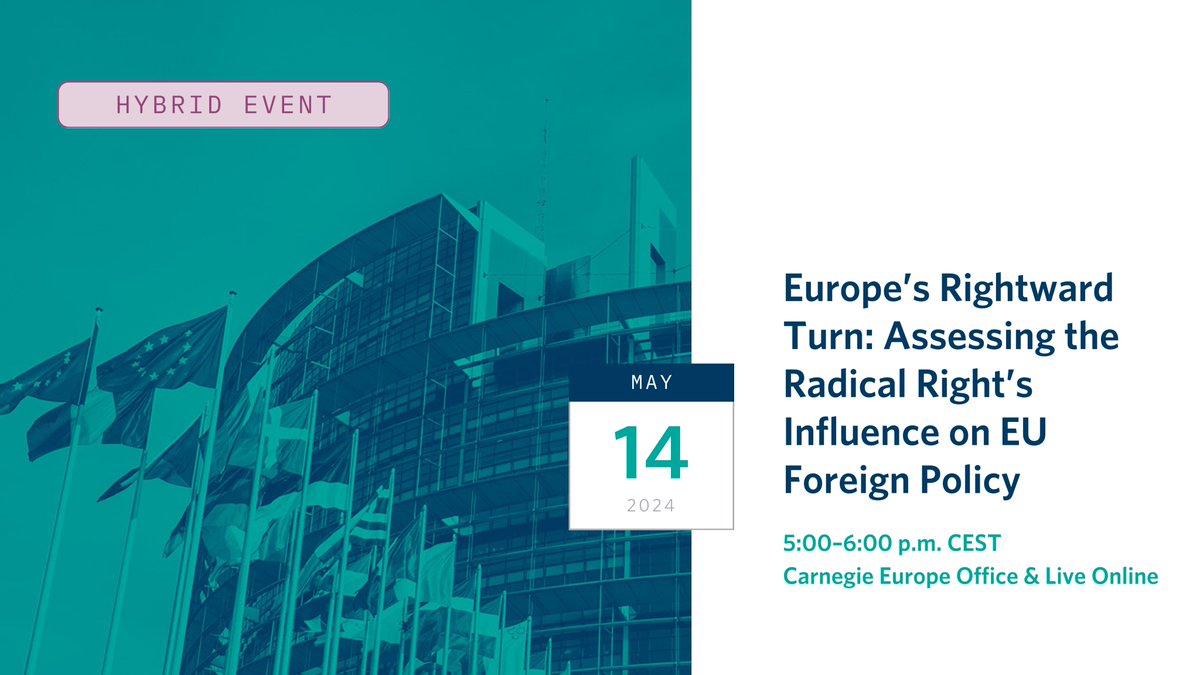
Ricardo Farinha
@farinha_ric
Program Manager, @CarnegieDCG, @Carnegie_Europe
ID: 1291063408868167681
05-08-2020 17:28:05
41 Tweet
81 Followers
1,1K Following

With the radical right rising, how can the EU safeguard #democracy & preserve its internal cohesion and external credibility? On May 14, Rosa Balfour, Pekka Haavisto, Zsuzsanna Szelenyi, & Ivana Dragicevic will unpack the challenges ahead. Join in person or online ➡️ carnegieeurope.eu/e-8290


🛡️ | In the past decade, #defense has been the domain with the largest number of major new EU initiatives. But the growing European security field should be made more inclusive, accountable, and transparent, argue Ricardo Farinha & Richard Youngs ⤵️ carnegieeurope.eu/2024/04/24/sec…

The EU faces a "triple-nexus challenge": conflict, climate change, & democratic backsliding. These interlinked crises require a less fragmented & more integrated strategy, write Richard Youngs, Ricardo Farinha, Jasper Linke, & Jeremy Wetterwald ⏬ carnegieendowment.org/research/2024/…

🆕 | There is evidence of a fast-accumulating triple nexus between the climate, conflict, & #democracy crises. The EU needs an integrated strategy to address these issues as a whole, write Richard Youngs, Ricardo Farinha, Jasper Linke, & Jeremy Wetterwald. carnegieendowment.org/research/2024/…

Europe's focus on security has sidelined the interconnected issues of climate change, conflict, & democracy. The EU's new climate security strategy should recognize the linkages & tackle the crises holistically, argue Richard Youngs, Ricardo Farinha & al. 👇 carnegieendowment.org/research/2024/…

Current EU policies fail to address the mutually reinforcing links between climate, conflict, and democracy crises. Brussels must pursue an integrated strategy to tackle this triple nexus, argue Richard Youngs Ricardo Farinha et al. for Carnegie Europe⬇️ carnegieendowment.org/research/2024/…

🍃 | As #climate impacts become more dramatic and tangible, conflict dynamics have deepened too. The EU must develop a more cross-cutting approach that addresses these challenges through an integrated strategy, say Richard Youngs, Ricardo Farinha et al. 👇 carnegieendowment.org/research/2024/…

📢 | EVENT ALERT On Thursday, December 12, Carnegie Europe will host a special event with Mark Rutte Mark Rutte. Following his speech, the secretary general will join CE Director Rosa Balfour for a conversation on the alliance's priorities. Register ➡️ carnegieendowment.org/events/2024/12…


🚨 Join Carnegie Europe as it hosts a special event with Mark Rutte Mark Rutte! The secretary general will deliver a speech on his vision for the future of the NATO alliance & join Carnegie Europe Director Rosa Balfour for an in-depth conversation on the alliance's strategic


EU foreign policy faces tightening nexus between three global challenges: climate change, conflict, the crisis of democratic governance. Our new report maps out how these crises increasingly overlap and proposes how the EU should respond. Ricardo Farinha carnegieendowment.org/research/2024/…

Climate change, conflict, and democracy are not new policy concerns for the EU. However, the mutually reinforcing links between these issues have recently become more unsettling and consequential. Richard Youngs Ricardo Farinha et al. for Carnegie Europe👇 carnegieendowment.org/research/2024/…

There is evidence of a fast-accumulating triple nexus between the crises of climate change, conflict, and democracy. Yet, current EU policies are not equipped to fully deal with this challenge. Richard Youngs Ricardo Farinha et al. for Carnegie Europe👇 carnegieendowment.org/research/2024/…

🍃 | The EU considers conflict drivers, #climate stresses, and democracy issues largely in isolation from each other. But none of the issues can be understood or tackled separately from the others, argue Richard Youngs, Ricardo Farinha & al. 👇 carnegieendowment.org/research/2024/…

🆕 | The EU's Common Security and Defense Policy is increasingly focused on 🇪🇺 immediate interests and #security concerns. Brussels should find ways to restore CSDP as a key part of its democracy-support toolbox, argues Ricardo Farinha. Read his latest ⤵️ carnegieendowment.org/research/2025/…

The EU's CSDP originally sought to contribute to #democracy-support goals in the framework of wider peacebuilding efforts. But governance-related elements have diminished over time in favor of more pragmatic security cooperation. Ricardo Farinha explains 👇 carnegieendowment.org/research/2025/…

The EU's CSDP has increasingly deprioritized democracy-related commitments in favor of security priorities. In his newest for Carnegie Europe, Ricardo Farinha argues that the union must restore CSDP as a meaningful part of its democracy-security toolbox👇 carnegieendowment.org/research/2025/…

"Geopolitical challenges mean the EU needs to find ways of recovering the CSDP as a meaningful part of its democracy-support toolbox," writes Ricardo Farinha. Read his full piece for Carnegie Europe⬇️ carnegieendowment.org/research/2025/…

The EU's #CSDP reflects the union's general drift toward hard, geopolitical power. Although most deployments since the policy's inception have been civilian, the EU has since 2010 launched more military than civilian missions, explains Ricardo Farinha. carnegieendowment.org/research/2025/…

In its early days, the CSDP included democracy-related commitments. However, its recent sidelining of such commitments raises questions on how the policy relates to the EU's principle of democratic security. Ricardo Farinha examines for Carnegie Europe👇 carnegieendowment.org/research/2025/…

EU member states have generally hesitated to provide rule-of-law experts and judges to #CSDP missions. Many EU countries drew the lesson that the policy's governance-related elements had struggled to meet their stated aims, explains Ricardo Farinha. carnegieendowment.org/research/2025/…